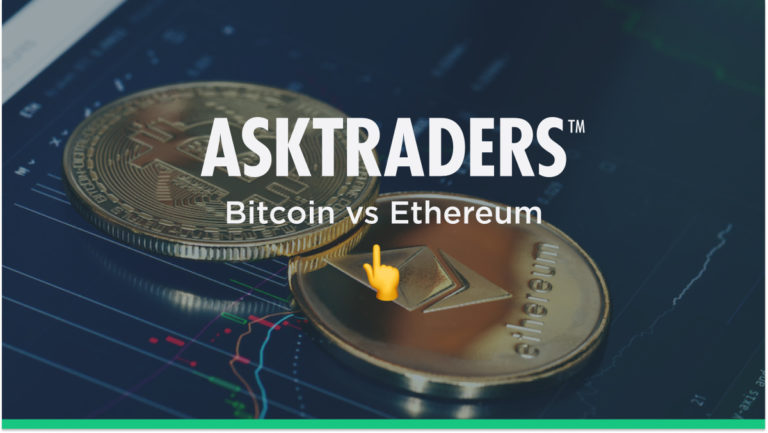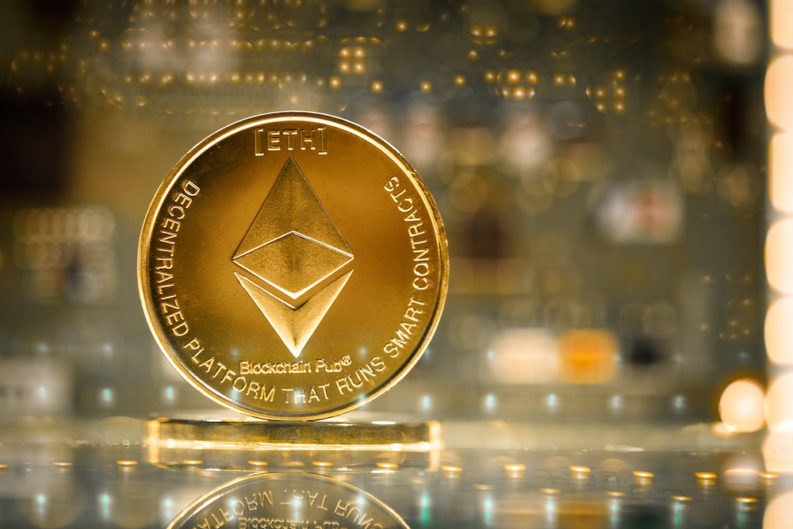
Between them, these two coins have market capitalisations that dwarf all the other coins. New and exciting altcoins may be campaigning for the top spot, but it is BTC and ETH that currently act as the front two in the race to be the world’s global currency. When pitting Bitcoin vs Ethereum, which one comes out on top?
Why is that important? The established view is that only one of many thousands of cryptocurrencies will come through as a champion of the new technology. If it is successful at overturning the financial orthodoxy, then its value will be exponentially more than it is today. For the others, failing to be the dominant crypto could well leave them worthless also-rans.
- What Is Bitcoin?
- What Is Ethereum?
- Why Do People Confuse Them?
- How Are They Different?
- Next Steps For Bitcoin And Ethereum
WHAT IS BITCOIN?
Bitcoin was the first cryptocurrency to emerge in 2009. It is a digital medium of exchange that is encrypted and nearly impossible to trace. Transactions made through this coin use blockchain protocols and are anonymous except for the origin and destination addresses for each transaction.
Bitcoin initially caught the attention of tech-savvy alternative thinkers primarily because it promises to ‘decentralise’ how financial markets work. That means it can change how the common person can take charge of their finances, and in extension how the global financial system works. If that happens the Bitcoins on the network will take on the value of fiat currencies such as the US dollar, euro, and British pound and be priced at higher than where Bitcoin has ever traded during its relatively short lifespan.
The promises of a decentralised economy come from the fact that anyone with the appropriate computing power and equipment can record transactions into it. Why transactions? The blockchain acts like Bitcoin’s public ledger, where all movements from one address to another are recorded.
The protocols the Bitcoin platform uses means transactions will involve the key elements of any means of exchange – security, but it will also allow for anonymity. If the tech framework is developed sufficiently, Bitcoin transactions will also be super-efficient and there will be no need for cross-border transactions and forex exchange costs. Instead, a buyer of BTC in Singapore and a seller in London would just process the transaction seamlessly.
The key price driver for Bitcoin is the level to which is becomes accepted as the new way of doing things, and its use as a store of value and as a medium of exchange.
WHAT IS ETHEREUM?
Ethereum is actually not a cryptocurrency. In fact, Ethereum is a platform for the creation and utilisation of smart contracts to conduct different transactions of different nature. The Ethereum network, however, is fuelled by the coin Ether.
The Ethereum project was released in 2014 by Vitalik Buterin, and it has quickly become one of the most influential cryptocurrencies around. Buterin was closely associated with the early stage development of Bitcoin and set up Ethereum with the aim of taking the best parts of the Bitcoin blockchain but incorporating improved tech protocols to create a network with superior functionality.
Why is Ethereum so influential? Well, because its blockchain got first-mover advantage of the second generation coins and takes what Bitcoin brought, and elevates it to a whole new level. It not only allows for the transmission of value; those previously mentioned smart contracts are a revolutionary technology which was introduced by this platform. They are self-executing programmes that activate as soon as specified conditions are made. Users of the Ethereum platform can also create their own smart contracts and set everything from their requirements to the actions they perform.
As such, smart contracts can be used for virtually everything, from escrow services to communications. As new elements of the digital ecosystem have emerged, it has been the Ethereum platform that they have selected to use. The NFT (Non-fungible token) sector, which burst onto the scene in 2021 is largely based on the Ethereum platform.
WHY DO PEOPLE CONFUSE BITCOIN AND ETHEREUM?
The main misconception comes from the fact that not everything built on blockchain is a cryptocurrency. Both platforms are currently being treated, and traded, as a medium of exchange. Comparing Bitcoin vs Ethereum is seen like comparing a dollar with a euro, while it is actually more akin to comparing a Dollar with salt or silver and gold coins.
However, both do have their own coins (Bitcoin and the Ether from Ethereum), and both can be used as money. However, that is only due to the definition of what money is and how different elements can qualify as such. Today, Ethereum, Ripple, and many other platforms with cryptocurrencies within them are seen as cryptocurrencies themselves; it is enough to hear how people refer to Ether (Ethereum’s coin) Ethereum, confusing the platform with the currency.

Source: iStock
HOW ARE THEY SIMILAR?
1. Both Are Decentralised and Blockchain-Based
This is the main reason that points people to conclude that a platform is a cryptocurrency and a medium of exchange. It may sound humorous, but the truth is that many investors think that blockchain equals cryptic medium of exchange. Ethereum may be a platform for smart contracts fuelled by a cryptocurrency, but it is only another coin thanks to having the Ether.
Despite the differences between Bitcoin and Ethereum, the truth remains that both are technically and significantly similar. Regardless of having different objectives (which we already talked about and will explain in a moment), there is an inherent truth in that both function on top of a blockchain and include an asset that is valuable and usable as a medium of exchange.
For Bitcoin, it is its homonymous crypto coin; for Ethereum, it is the Ether token, even though traders also refer to it as Ethereum. Both are useful to make fast and secure transactions without being limited by borders. Additionally, neither of them is controlled by a central entity, and the emission of new units is done by volunteers amongst the members of the community.
2. Both Are Usable As Money.
As touched upon briefly in the previous point, both coins can be used as a medium of exchange thanks to their characteristics. Both coins from each platform are valuable, limited, and divisible. As such, both of them enjoy the same foundations traditionally given to what elements can be used as money. When we said that comparing Bitcoin vs Ethereum was like comparing the dollar with salt, we meant that both could be (and have been) used as money.
The first medium of exchange was salt since it was valuable, limited, and could be divided in smaller portions. If we take those characteristics, it is very similar to what gold is, or even how dollars work. However, both are different even in those same features, even if only slightly so. The same applies to Ethereum and Bitcoin; despite one being aimed towards fuelling smart contracts and the other towards transmitting value, both can be used for the latter. In this case, Bitcoin would be a Dollar and Ethereum the salt. Also, the value for both BTC and ETH comes from how popular and accepted each platform is and the advantages offered by them, even if they vary between the two.
HOW ARE THEY DIFFERENT?
Despite their similarities, both platforms, and even the concepts, are very different from one another. While they are technically almost equals, they are fundamentally very different. Not only do they have different features, but they even have different objectives and purposes.
They have different goals – The goal for Bitcoin is to replace money, to put it bluntly. Some people say that its objective is to be a parallel currency; similar to how a Euro is a parallel currency to the dollar and not its replacement.
Ethereum, on the other hand, has the set goal of creating an ecosystem centred on smart contracts and their applications. What it aims to do is to create a platform that can make virtually every service more efficient. From banking to communications, as we already stated, smart contracts can be developed and applied for almost anything, and what that strives to do is the goal of Ethereum.
They have influenced the world in a different way – To have different objectives means that they will impact the world in different ways as well.
Bitcoin has changed the way people see money and what makes something qualify as such. It has moved masses towards analysing the concept of a medium of exchange, and that is due to it being aimed towards that goal.
Ethereum has influenced the world in a completely different way. Through the development of smart contracts and the ERC20 token, the Ethereum project has given birth to a large portion of the cryptocurrencies we have today. From health service databanks to libraries, and from new banking systems to integrated lending platforms, many different projects have taken the features of the Ethereum platform to create their own solutions for modern issues.

Source: iStock
They are moving in different directions in terms of technological infrastructure – One of the major differences between Bitcoin and Ether is the way their transaction processing protocols are set to work. Both were set up to use Proof Of Work (PoW) protocols, which involve ‘miners’ solving complex equations. In turn, this results in them being rewarded for their work in the form of new coins and the platform at the same time keeping its books and records straight.
Ethereum is in the process of putting through a multi-year shift to using Proof Of Stake (PoS) protocols, which it claims will allow transaction times to be faster and more efficient. At the point when The merge is completed, the two coins will operate using very different tech infrastructure and how that pans out will significantly impact the price of both coins.
NEXT STEPS FOR BITCOIN AND ETHEREUM
Given the high-profile role cryptos now play, it’s sometimes surprising to recall they have been operating for little more than ten years. The sudden growth in interest in all coins has left them to some extent being victims of their own success.
The protocols of the Bitcoin and Ethereum platforms, for example, mean that they both currently use as much electricity each year as entire nations, such as Argentina and the Netherlands. At the same time, regulators and governments have threatened various clampdowns in an effort to protect their vested interests the existing financial system.
There’s no way of knowing if the developers of the first coins factored in the amount of energy they’d use. What is certain is that a carbon-footprint of that size is much more of an issue in the early 2020s than it was in 2009. Cryptos are having to find a way to face that challenge and the different ways that Bitcoin and Ether are solving their energy use problems will go a long way to determining how extensively each is adopted.
China’s clampdown on crypto in 2021 precipitated a crash in the price of Bitcoin and Ethereum, which carried on into the second half of 2022. When one of the markets biggest participant outlaws the mining and trading in crypto there is only one way price will head. The role of regulators will be crucial to the extent that Bitcoin and Ethereum can become widely accepted.
FINAL THOUGHTS
Bitcoin and Ethereum are essentially very different in their nature and in their goals. While the value of Bitcoin is driven by its security, privacy, and overall popularity and acceptance, the value of Ethereum and its Ether coin comes from its versatility. The intrinsic value of Ether comes down to the way is is required to operate and be part of the Ethereum platform and access its smart contracts. That is what makes Ether so desirable whereas Bitcoin is desirable due to its perceived value, more akin to what fiat money is today.
As such, ‘Bitcoin vs Ethereum’ is not a fight. Both platforms have their own competitive advantages and a direct comparison may at times require using a degree of nuance, but understanding the pros and cons of each enables investors to take a view on which of the big two might ultimately take the top spot.




